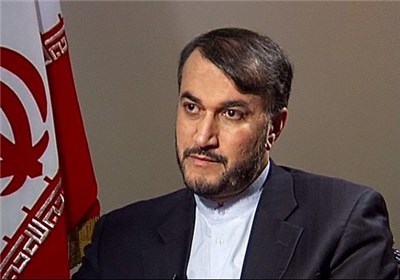PHOTO: Deputy Foreign Minister Hossein Amir-Abdollahian
LATEST
Iran has reiterated its support for Russian bombing of rebels, the Islamic State, and civilians in Syria.
Deputy Foreign Minister Hossein Amir-Abdollahian matched Moscow and the Assad regime in framing the campaign as a necessity to defeat “terrorists”: “Tehran supports Moscow’s anti-terrorism measures in Syria and its aid to the Syria army.”
Amir-Abdollahian also echoed President Assad’s claim, made in an interview broadcast on Iranian TV on Sunday, that US policies in the Middle East had only fed regional instability. He added that Washington’s support for the Saudi aerial intervention against “the people of Yemen” has led to the formation of “a new wave” in terrorism that is further “threatening the world”.
See Syria Feature: Assad Talks Tough After Russian Intervention — No Reforms, No Negotiations
Iran, along with Russia, has been an essential backer of President Assad during the 4 1/2-year uprising against his rule. Tehran has provided billions of dollars in economic assistance as well as commanders, fighters, and military supplies.
However, there are signs that — amid economic problems in Iran — the Islamic Republic has taken a back seat to Russia’s intervention, which escalated with bombing from last Wednesday as well as the injection of advanced battlefield equipment and hundreds of troops as “advisors”.
Speculation has centered on a visit by the head of the elite Qods Forces, General Qassem Soleimani, to Moscow in late July. The trip came as the Assad regime was facing defeat at the hands of rebels advancing in the northwest and the south, as well as the challenge of the Islamic State, and the inability of Tehran to fulfil Assad’s request for up to $6 billion in aid.
Ministers Warn of New Economic Crisis
Four senior ministers in the Rouhani Government have written to the President to warn of a new crisis for Iran’s troubled economy.
The Economy, Industry, Labour, and Defense Ministers warned that “incompatible” policies had restricted the movement of capital in the economy, as prices fell from sales of oil, metals, and minerals: “If urgent action is not taken, stagnation could turn into crisis.”
The letter, reportedly sent last month, cited a 42% fall in the capital market. The market value of petrochemical and chemical products has fallen by 35% while basic metals and oil products have seen declines of about 14%.
Mohammad Gholi Yousefi, an economics professor at Allameh Tabatabai University in Tehran, explained:
Almost half [of] the banks’ resources is practically blocked by the government, special customers, and banks themselves.
Part of the money is also blocked by banks that have invested the money in housing and malls, hoping for more return.
The fact that ministers publicly wrote this letter shows the depth of the crisis and confirms what independent economists have been warning about for some time.
After years of recession, Iran’s economy grew by three percent last year, but with 25 percent of graduates unemployed and inflation still high, the recovery remains vulnerable.
Middle class and poor Iranians have seen their purchasing power plummet since 2012, when inflation peaked. The local rial currency had already lost two-thirds of its value before Rouhani took office.
Rouhani Leads More Iranian Criticism of Saudi Arabia
For the 12th day in a row, Iran’s leaders have denounced Saudi Arabia over the September 24 stampede at the hajj to Mecca that killed hundreds — and maybe thousands — of pilgrims.
President Rouhani led Monday’s criticism in an address to a conference in Tehran, suggesting Saudi negligence:
There are so many cameras in Mina [the site of the tragedy], and their monitoring rooms are keeping an eye on all the streets and the whole crowd every single moment and can even take films and photos of the crowd….
Such an incident happens in a country that is in possession of so many helicopters, airplanes and petro-cash; [and] there has been mismanagement at the beginning of the incident and in its aftermath.”
Saudi Arabia has put the official death toll at 765, but Iranian officials say around 4,700 people were killed, including 464 Iranians.
See Iran Daily, Oct 1: Iranian Death Toll Rises to 464 from Mecca Stampede
The Supreme Leader has blasted Saudi mismanagement and called for a public apology. The Rouhani Government has demanded an investigation, and the Revolutionary Guards have warned of a “rapid and harsh reaction” if necessary.
The disaster and subsequent criticism have effectively buried Rouhani’s hope for engagement with the Saudis over regional crises.
Intelligence Minister Mahmoud Alavi said at a funeral service for an Iranian victim on Monday that evidence is being collected to assess whether the stampede “occurred with malice aforethought”.
Defense Minister Hossein Dehghan used a Sunday message to link the disaster to Iran’s challenge to the Saudis in the Middle East: “This terrible catastrophe along with inhumane crimes by Saudi rulers against the oppressed and defenseless Yemeni people, which are a reminder of the Zionist regime’s cruel crimes in Lebanon and Palestine, raises the alarm that [such crimes] should be stopped through absolute vigilance and prudence of Muslim countries.”
The fate of one high-profile Iranian remains unknown. Deputy Foreign Minister Hassan Qashqavi said he could not reject speculation that the former ambassador to Lebanon, Ghazanfar Roknabadi, had been abducted.
Roknabadi has been missing since September 24.

